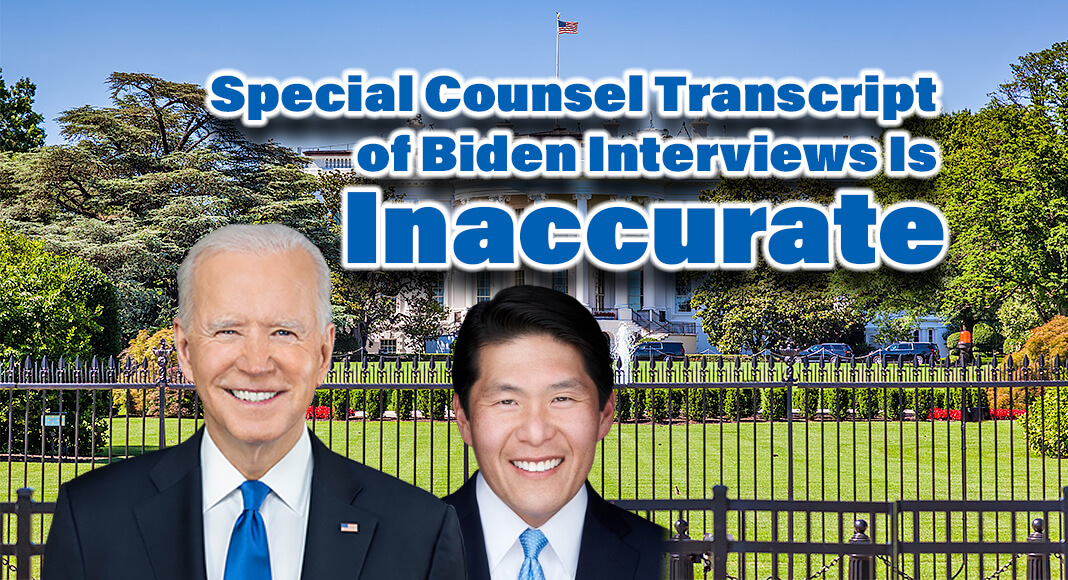
Judicial Watch
Washington, D C – Judicial Watch announced that the White House admitted in a federal court that the transcript of President Joe Biden’s testimony to Special Counsel Robert Hur is not accurate and is missing “filler words (such as ‘um’ or ‘uh’)” and words that “may have been repeated when spoken (such as ‘I, I’ or ‘and, and’)” which were sometimes “only listed a single time in the transcripts.” In its new filing the Biden Justice Department makes the extraordinary assertions of executive privilege and privacy to hide the Biden audio. The agency makes the unprecedented assertion that because “AI” could be used to alter Biden’s words the material should be kept secret.
The Justice Department filing, filed around 11:00 p.m. last night (Friday), reads in part:
13. After the interview, SCO [Special Counsel Office] created written transcripts of the audio recording with the assistance of a trained professional court reporter – one transcript for each day of the interview. I have read the entirety of the written transcripts of the interview. As I listened to the audio recording, I compared it to the transcripts of the audio recording and specifically listened for differences between the transcripts and audio recording. In a few instances, the transcripts indicate that some words from the audio recording are indiscernible. In listening to the audio recording and reviewing the transcripts, I agree that in those instances the words are indiscernible.
14. The interview transcripts are accurate transcriptions of the words of the interview contained in the audio recording, except for minor instances such as the use of filler words (such as “um” or “uh”) when speaking that are not always reflected on the transcripts, or when words may have been repeated when spoken (such as “I, I” or “and, and”) but sometimes was only listed a single time in the transcripts. Besides these exceedingly minor differences, based on my simultaneous review of the transcripts while listening to the audio recording, the transcripts accurately capture the words spoken during the interview on the audio recording with no material differences between the audio recording and transcripts. None of the minor differences include any audible substantive exchanges – that is, based on my review, there is no material omission of words be tween the audio recording and transcripts. Special Counsel Hur and FBI personnel who attended the interview and compared the audio recording to the transcripts also informed me of their determination that the transcripts accurately reflect the words spoken on the audio recording aside from the minor instances I described above. Special Counsel Hur emphasized to me that it was important for purposes of his investigation that the interview transcripts be accurate.
“Wow. Judicial Watch’s FOIA lawsuit forced the Biden team to admit what everyone suspected – that the transcript is not accurate and was changed in a way to help Biden,” said Judicial Watch President Tom Fitton. “There is nothing ordinary about this, and the transcript inaccuracy issues seem to help Biden’s political campaign needs. We today initiated a new FOIA request on this Biden’s Nixonian tape scandal.”
On March 11, 2024, Judicial Watch filed its FOIA lawsuit against the U.S. Department of Justice in the U.S. District Court for the District of Columbia after the Department of Justice failed to respond to a February 2024 FOIA request for records of all Special Counsel interviews of President Biden (Judicial Watch, Inc. v. U.S. Department of Justice (No. 1:24-cv-00700)). A redacted transcript of the Biden interview was released on April 15.
In April, the Justice Department told the court that it would not disclose the audio recordings of special counsel interviews with President Joe Biden in order to protect Biden’s “privacy” interests.
On February 5, 2024, Hur issued the “Report of the Special Counsel on the Investigation Into Unauthorized Removal, Retention, and Disclosure of Classified Documents Discovered at Locations Including the Penn Biden Center and the Delaware Private Residence of President Joseph R. Biden, Jr.”
In the report, Hur called Biden a “well-meaning, elderly man with a poor memory” and declined to charge Biden with a “serious felony:”
We have also considered that, at trial, Mr. Biden would likely present himself to a jury, as he did during our interview of him, as a sympathetic, well-meaning, elderly man with a poor memory. Based on our direct interactions with and observations of him, he is someone for whom many jurors will want to identify reasonable doubt. It would be difficult to convince a jury that they should convict him-by then a former president well into his eighties-of a serious felony that requires a mental state of willfulness.
Prior to the finalization of the report, the White House issued a letter to the Special Counsel’s office attacking the report’s “treatment of President Biden’s memory,” and added “there is ample evidence from your interview that the President did well in answering your questions …”
The Heritage Foundation and a CNN-led media coalition have recently been joined with Judicial Watch’s lawsuit.Judicial Watch has several ongoing FOIA lawsuits about Biden’s document scandals and the related unprecedented partisan prosecutorial and judicial abuses of former President Donald J. Trump.













